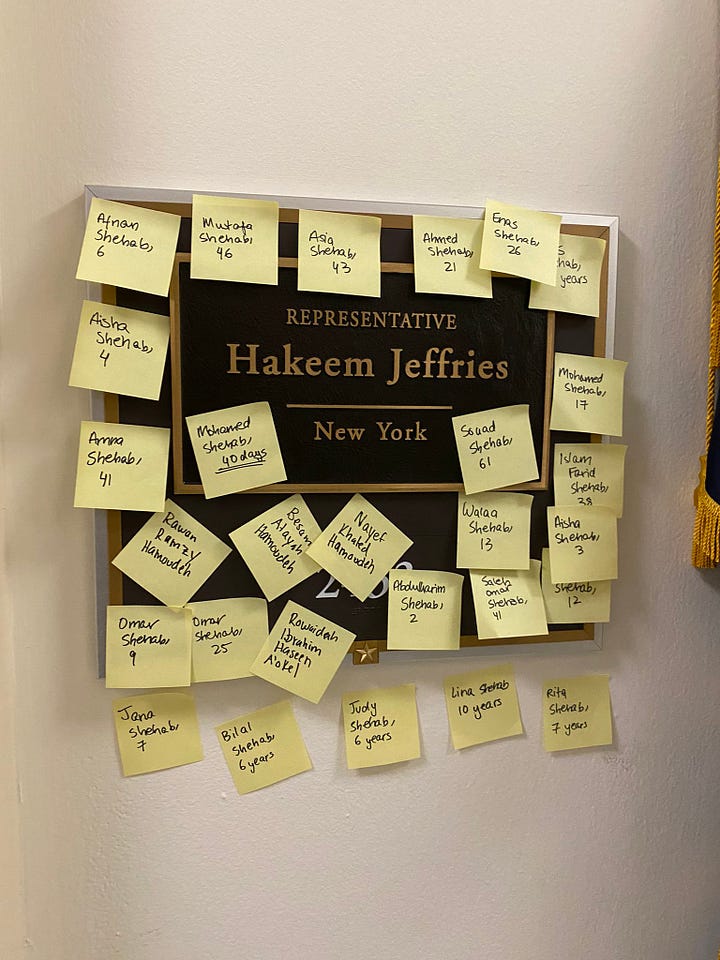I’m writing from a conference in Washington, D.C., that’s focused on reporting about the military. We’re talking about wars: Ukraine, Afghanistan, and, of course, Israel. But I keep thinking about all of the people I’ve spoken to this week who are tired of wars and desperately want them to end.
This week, I saw Jewish, Muslim, and Christian faith leaders occupy the office of Minority Leader Hakeem Jefferies, crying and calling out the names of Palestinians killed in Israeli airstrikes. I watched a heartbreaking video in which an Al Jazeera reporter discovers his wife and two children were killed in an airstrike while he was on air.


I keep thinking about the pain of discovering that your whole family has been wiped out and how impossible it would be to recover from that. I think of the mothers whose premature babies are kept alive in hospitals that are about to run out of power. I think about the powerlessness, the desperation, the anguish when you cannot help your loved ones, and the knowledge that you will be scarred for life because people you love will die horrible, unnecessary deaths.
I’m thinking about the numbers, too: 2.3 million Palestinians and an estimated 15,000 to 30,000 Hamas fighters in Gaza. How many people will die so Israel can target less than 2 percent of Gaza’s population? Thousands of people are already dead, and only a handful of them are militants.
Israel has reportedly stopped using its controversial “roof knocking” tactic, used to alert a building’s occupants that the IDF is about to drop a bomb on them, ostensibly giving them time to flee to safety.
I’m not arguing that Israel should go soft on Hamas. What the militant group did to Israeli civilians is devastating. It’s hard to imagine what the family members of hostages in Gaza are experiencing right now, not to mention the hostages themselves.
But some military experts say there could be a way to target the militants responsible for the atrocities of October 7 that doesn’t require dropping bombs on innocent families.
In a conversation this week with a source in Israel, the person I spoke to pointed out that many of the Israelis living in the communities Hamas targeted were leftists, people committed to peace and cohabitation with their Palestinian neighbors.
They passed me the translation of a eulogy for one of Hamas’s victims. It contains a call for peace and perhaps a message to Israel’s leadership. I want to share a small excerpt here:
My father was a man of the world in every sense of the word. In his travels and tours over all the continents, in his uncompromising commitment to ecological struggles no matter the size, and in the cultures he learned to value and about which he taught us.
At home we heard sayings in Arabic, songs in French and Spanish, lessons in Italian and English, with a strong, unapologetic Israeli accent…..
My father was murdered and abandoned by people who aren’t capable of understanding this. Racists who hate the stranger, fanatics who sanctify death and vengeance over life.
We won’t let the politicians who abandoned my father dance on the blood with which Kibbutz Be’eri is soaked. We won’t be silent as the cannons roar, and we won’t forget that my father loved peace.
What I’m writing:
• I wrote about the potential pitfalls of an Israeli ground invasion of Gaza and why it could strengthen Hamas. This story is unlocked and free to read.
• My colleague Savannah Behrmann and I wrote about the Biden administration’s budget request for Israel and Ukraine and whether it can pass Congress. This story is unlocked and free to read.
• Savannah Behrmann and I appeared on National Journal’s weekly podcast to discuss war in the Middle East and the Biden administration’s request for $106 billion for Israel and Ukraine.
My Weekly News Blubrs:
What I’m reading:
• The Health Ministry in Gaza published a list naming the 6,747 people it claims have been killed in Israel’s bombing campaign, the New York Times reports. The list appears to respond to U.S. President Joe Biden’s comments that he had “no confidence in the number that the Palestinians are using.” The list includes 2,665 children.
• Forty-nine percent of Israelis believe “it would be better to wait” rather than invade Gaza immediately, according to a new poll. A similar survey from a week ago found 65 percent support for a large-scale ground offensive. Reuters has the story.
• The Israeli Defense Forces struck a mosque in Jenin in the northern occupied West Bank after it alleged that Hamas was using it as a “terrorist compound,” the BBC reports.
• Militancy in the West Bank is increasing following a rise in Israeli counterterrorism operations, the Washington Post reports. Israel’s pre-emptive operations are prompting the radicalization of young men.
• Israel has set up hundreds of volunteer security squads since the Israel-Hamas war began to patrol the streets and serve as back-up to the police, Reuters reports. The civilian security squads will receive 40,000 firearms in case of Jewish-Arab unrest within Israel.
• U.S. President Biden expressed alarm over the “extremist settlers” attacking Palestinians in the West Bank, whom he accused of “pouring gasoline on fire,” the New York Times reports. Biden also reiterated his support for a two-state solution once the Israel-Hamas war is over.
• European Union leaders met in Brussels to find a common position on the Israel-Hamas war following weeks of disunity, the BBC reports. Member states are divided on whether to call for a ceasefire, a single humanitarian pause, or several pauses. Germany, Austria, Hungary, and the Czech Republic staunchly support Israel. Spain and Ireland have expressed concern for the Palestinians.
• European Union leaders later called for “humanitarian corridors and pauses” in the fighting to allow aid into Gaza, the Guardian reports.
• The Gaza war is pushing ideologically opposed groups within Israel to work together, Ha’aretz reports.
• Public trust in the Israeli government is at a low amid criticism of an inadequate war response, the Times of Israel writes.
• Around 500 Hamas and Palestinian Islamic Jihad militants received specialized combat training in Iran as recently as September, the Wall Street Journal reports.
• Hamas representatives visited Russia to discuss the war with Israel in a meeting that was also attended by Iran’s deputy foreign minister, the Times of Israel reports.
• The Washington Post has an incredibly detailed piece on collaboration between Ukrainian security services and the CIA. “Since 2015, the CIA has spent tens of millions of dollars to transform Ukraine’s Soviet-formed services into potent allies against Moscow,” the report reads.
• Ukraine’s justice minister Denys Maliuska says Ukrainian authorities will not hesitate to prosecute its oligarchs, Reuters reports. The announcement comes after billionaire Ihor Kolomoisky, once viewed as Ukrainian President Zelensky’s chief patron, was jailed last month on fraud and money laundering charges.
• Ukrainian billionaire Ihor Kolomoisky, arrested on suspicion of fraud and money laundering, transferred corporate rights over his 1+1 media group to the company’s employees, Radio Free Europe reports.
• Ukraine’s newly formed Siberian Battalion recruits Russian citizens to help the ongoing fight against Moscow, Reuters reports. An anonymous Ukrainian military officer confirmed that the majority of the unit’s 50 members are indigenous people of Siberia who are eager to fight against what they perceive to be Russian imperialism both inside their homelands and in Ukraine.
• Georgia's ruling party and its allies in parliament failed in their bid to remove the country's president, Salome Zourabichvili, EurasiaNet reports.
• Azerbaijan is no longer interested in securing a land corridor through Armenia to the Azerbaijani enclave of Nakhichevan and will instead discuss the issue with its southern neighbor Iran, Reuters reports.
• Armenia is increasingly keen on Western mediation, while Azerbaijan prefers to see regional powers like Russia and Turkey participate in negotiations, EurasiaNet reports.
• France is selling military equipment such as air defense systems to Armenia as fears grow that Azerbaijan could follow up its seizure of Nagorno-Karabakh with assaults on its neighbor's territory, Politico Europe reports.
• Recent Turkish drone strikes on Kurdish-held areas of northeast Syria damaged critical infrastructure and resulted in water and electricity disruptions for millions of people, Human Rights Watch said.
• Turkish President Recep Tayyip Erdoğan sent Sweden’s NATO accession bid to parliament for ratification in a move that ends the long-standing uncertainty over whether Ankara would delay the process further, Politico Europe reports.
• The leaders of Serbia and Kosovo met separately in Brussels with the leaders of France, Germany, and Italy for talks aimed at normalizing relations between Belgrade and Pristina, a month after a deadly attack in the north of Kosovo by armed Serbs, Radio Free Europe reports.
• The leaders of Serbia and Kosovo broke off talks without signaling progress after European Union leaders weighed in to help them bridge their differences and start enacting an agreement they endorsed several months ago, PBS reports.
• Robert Fico was appointed Slovakia’s prime minister after winning elections in September, Reuters reports.
• Slovakia is stopping arms deliveries to Ukraine following the new appointment of Prime Minister Robert Fico, who said his country still supports non-military aid to Ukraine, the New York Times reports.
• Finland claims a Chinese ship anchor is likely responsible for the rupture of an undersea gas pipeline between Finland and Estonia in the Baltic Sea earlier this month, the Wall Street Journal reports.
• Armita Geravand, a 16-year-old Iranian girl dragged out of a train carriage unconscious on her way to school, was pronounced brain-dead by state-owned media, the New York Times reports.
• El Salvador’s President Nayib Bukele registered as his party's candidate to seek re-election in the country's presidential vote next year, even though the constitution prohibits it, ABC News reports.
• Javier Milei, a far-right libertarian, came second in Argentina’s presidential election, pitting him against the center-left economy minister in next month’s run-off, the New York Times reports.
You can write to me for any reason: c.maza@protonmail.com









I'd be curious which military experts are saying Israel could target Hamas with fewer civilian deaths than is currently the case. If they're right, I hope Israel listens to them, but how many such deaths can realistically be avoided when fighting an enemy that purposely puts itself amidst civilians?
Has anyone in your conversations brought up Dresden in 1945, or Mosul in 2016-17? Bombings killed thousands of civilians in each of those cities, too, and no one seriously argued that they changed the overall moral calculus of the conflict. It was still clear who the villains in each case were.